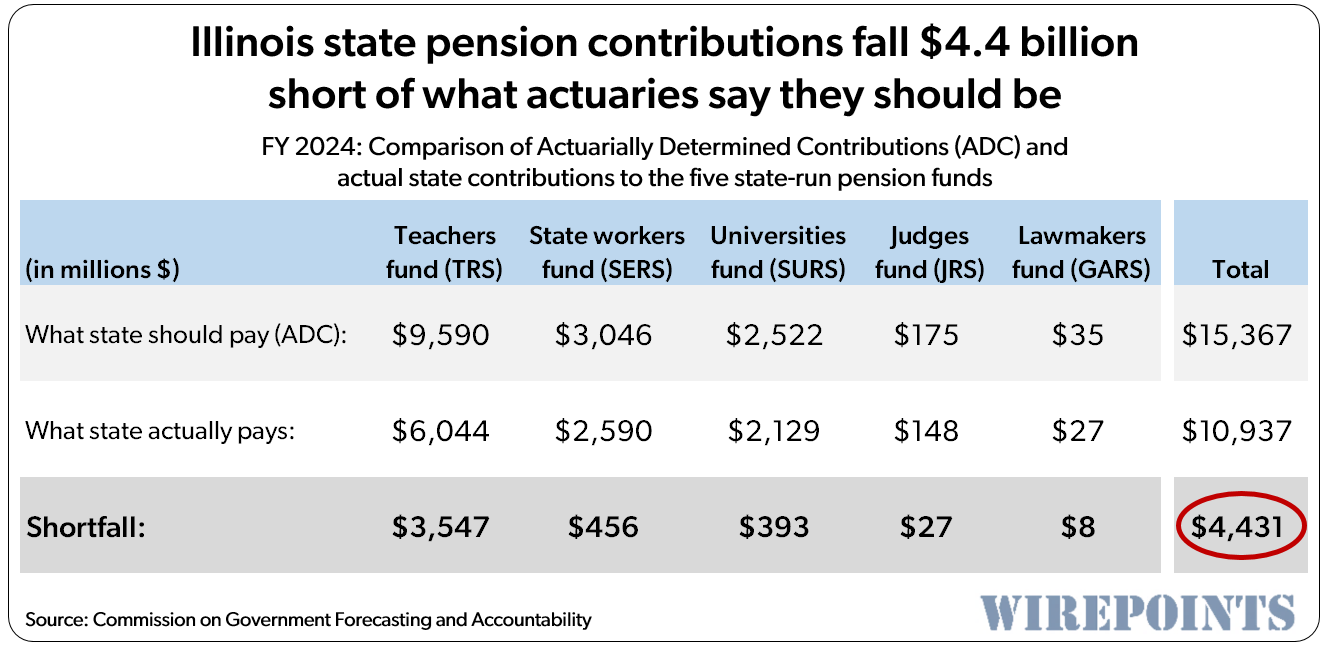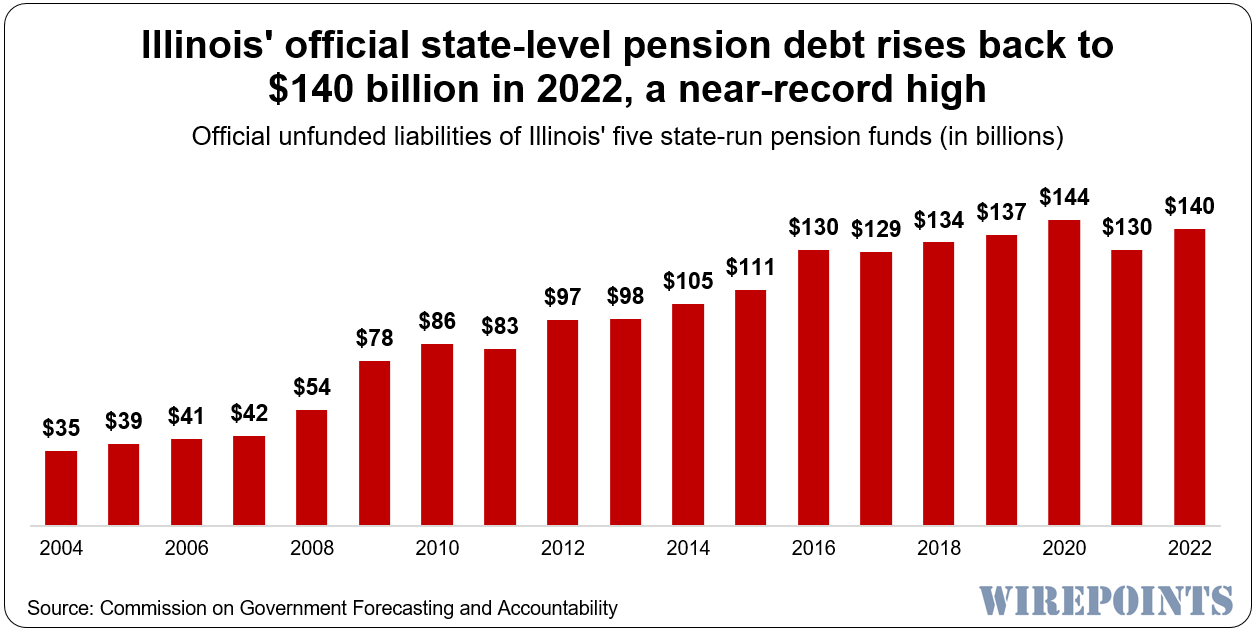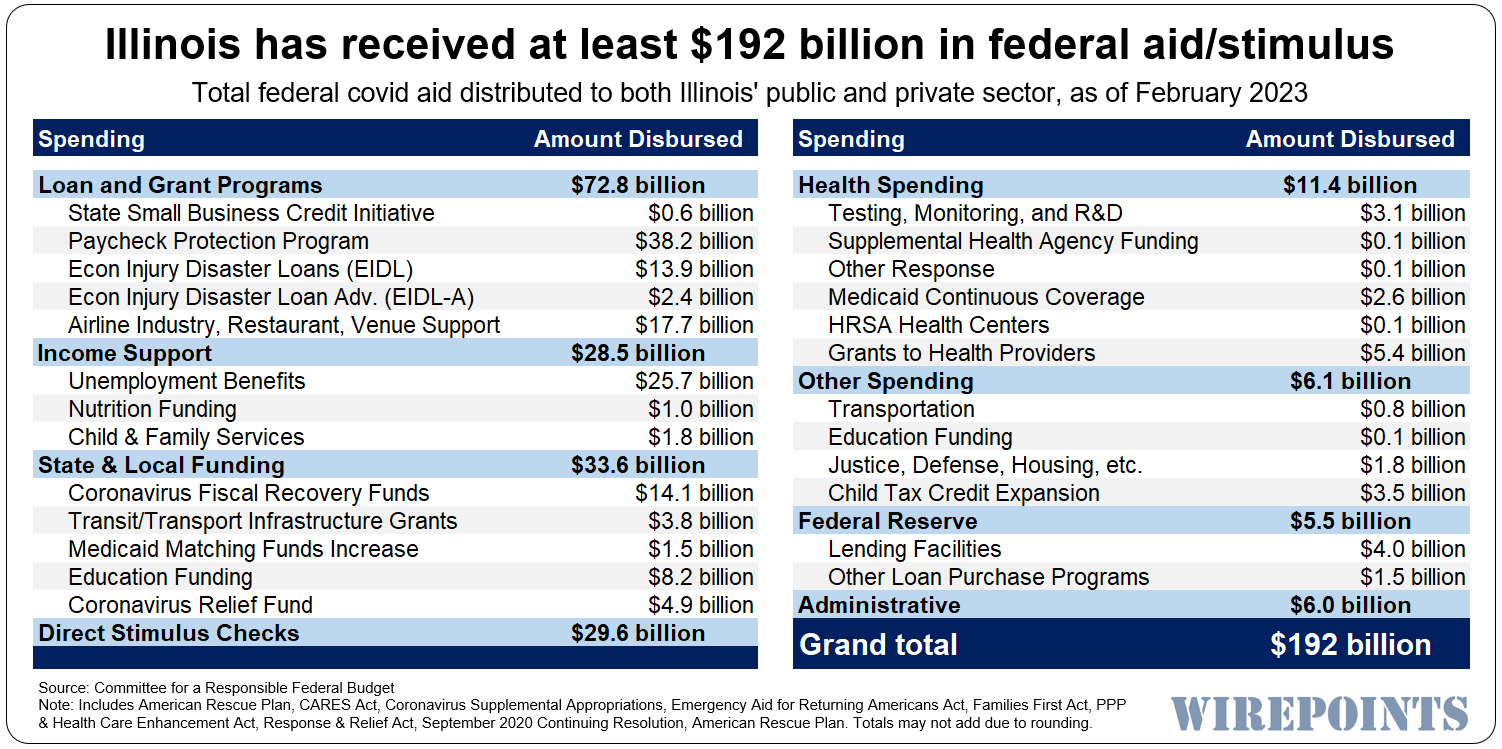State lawmakers have sent Gov. J.B. Pritzker a $50.6 billion 2024 budget for him to sign.
For the most part, it’s the same old story that’s played out for the last two decades. Little time for lawmakers to review thousands of pages of line items. No tax relief, just more and more spending. Another unbalanced budget. Billions more in pension debt pushed into the future. And, of course, a salary hike for lawmakers.
Unsurprisingly, it’s all been accompanied by good old-fashioned back slapping by Pritzker, Senate President Don Harmon and House Speaker Chris Welch about how they’ve once again “balanced” the budget, made significant “investments,” and prioritized those most in need. But look beyond the rhetoric and it’s clear the latest budget perpetuates what’s made Illinois an extreme outlier in pension debts, property taxes, joblessness and out-migration.
Three good examples below – on pensions, Medicaid for illegal immigrants and the upcoming AFSCME contract – capture the ongoing budget gimmickry in Illinois:
1. Pensions shorted yet again
The budget is unbalanced by at least $4.4 billion. The state’s actuaries calculate that Illinois’ five state-run pension funds require $15.4 billion in state contributions for 2024. But lawmakers, as usual, will contribute only the statutory requirement of about $10.9 billion. We detailed the $4.4 billion shortfall back in November when we reported that Illinois’ officially-reported pension debts had once again jumped back to the $140 billion level.

It’s the same pension game that’s gone on for decades and precisely how Illinois ended up with the biggest pension debt and lowest credit rating in the country. Keep increasing benefits to satisfy the unions and let future lawmakers figure out how to fund the shortfalls. (See: Illinois Pensions – Over Promised & Overgenerous)

2. Medicaid for illegals funding gap
The $1.1 billion cost for Medicaid benefits for illegal immigrants reportedly caused the biggest holdup on the budget. Lawmakers couldn’t agree on how to handle the massively expensive line item and in the end, lawmakers punted on the issue instead of addressing the problem head on.
To get to a “balanced” budget, they reduced the line item for the program to $550 million and gave Gov. Pritzker “emergency rulemaking authority” to reduce program costs from the estimated $1.1 billion. It’s hard to see how Pritzker pulls off those cost reductions given the immense pressure from pro-immigrant groups and the questionable legality of those emergency powers.
And the above assumes the original $1.1 billion cost estimate is correct. It’s impossible to know how many illegal immigrants will end up in Illinois expecting healthcare coverage and what the final costs will be.
3. A more expensive AFSCME contract
The state’s contract with AFSCME ends on June 30, 2023 – another expense that lawmakers didn’t account for in the new fiscal year. As Sen. Win Stoller noted in his address to the General Assembly: “that’s $200-300 million dollars not included in this budget.”
Illinois state workers were already some of the most-well paid in the county, with a total compensation package totaling near $110,000, four years ago when Gov. Pritzker largely granted AFSCME’s contract demands.
Today, count on the union to ask for big raises to make up for the recent record rate of inflation. They’re also sure to ask for increased health insurance benefits and other employment perks. Wirepoints will do a deep dive on the details once contract negotiations are in full swing.
**********************************
We’d be remiss to not comment on the important claims made by the governor related to some “improvements” to the state’s finances. They include several credit rating upgrades, some increased budget contributions to both pensions and the state’s rainy day fund, as well as the continued reduction in Illinois’ unpaid bill backlog. They’re all true and, everything else equal, they’re good news.
But what the governor consistently leaves out is that virtually none of those improvements have come from actions taken by him or the legislature, as we’ve repeatedly reported. There have been no spending or structural pension reforms. Instead, the short-term “improvements” are due to the ballooning state tax coffers that resulted from the nearly $200 billion in covid-related bailouts given to Illinois’ private and public sectors over the past three years.

A final note about this budget. For all the talk of priorities and “investments,” the state’s three leaders willingly kept an extension of Illinois’ only scholarship program for K-12 low-income, working-class students out of the budget bill.
Pritzker, Welch and Harmon have killed school choice in Illinois at a time when states around the country are making their own programs universal.
This budget is a perfect summation of their priorities. Unions, and even non-citizens, win out over students and taxpayers.





 Alerts Sign-up
Alerts Sign-up